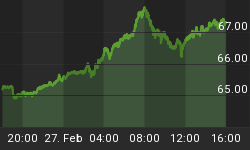Please understand that this article is about more than safeguarding your money; it's about saving you headache and heartache. It's about giving you peace of mind.
Before I explain, please allow me to ask a few questions:
- Have you given much thought about the money in your banking accounts lately? Do you know if it's safe?
- Have you thought about what might happen if your bank fails?
- Did you know you could be left in the lurch for days, weeks, even months before you get your money back from the FDIC?
- What happens if the FDIC can't cover your funds?
- How do you find a safe bank to protect your deposits right now?
I hope you've given these questions some serious thought.
I have to be honest: These questions were about the farthest things from my mind until about a year ago, when I downloaded the free "Safe Banks" report from my colleagues at Elliott Wave International. At first, the report scared me: I thought, "Oh My Gosh! I could lose all of my money if my bank fails. What would I do?"
But as I read on, I figured out that the report was not only about making my money safe; it was about giving me peace of mind.
If you've read any of the following news items, perhaps you understand the fear of learning your money might not be safe. Here's a recent story from Bloomberg:
Sept. 24 (Bloomberg) -- In May, the FDIC said it was projecting $70 billion of losses during the next five years due to bank failures. The agency said it expects most of those collapses to occur in 2009 and 2010.
The FDIC's problem is that it didn't collect enough revenue over the years to cover today's losses. The blame lies partly with Congress. Until the law was changed in 2006, the FDIC was barred from charging premiums to banks that it classified as well-capitalized and well-managed. Consequently, the vast majority of banks weren't paying anything for deposit insurance.
Of course, we now know it means nothing when the FDIC or any other regulator labels a bank "well-capitalized." Most banks that failed during this crisis were considered well-capitalized just before their failure.
By the end of 2009, more than 130 banks will have failed. Most depositors will have little clue their bank was even at risk. Worse yet, the string-pullers in Washington are doing everything in their power to hide information about the safety of your bank from you.
So far, the FDIC has had enough money to cover insured depositors. But that money is quickly running out.
Just last week, the FDIC voted to mandate early payment of insurance premiums to help cover at-risk banks. But only time will tell if this move will provide the funds needed in the years ahead. Here's what the Associated Press reported on Thursday, Nov. 12:
WASHINGTON (AP) -- U.S. banks will prepay about $45 billion in premiums to replenish a federal deposit insurance fund now in the red, under a plan adopted Thursday by federal regulators.
The Federal Deposit Insurance Corp. board voted to mandate the early payments of premiums for 2010 through 2012. Amid the struggling economy and rising loan defaults, 120 banks have failed so far this year, costing the insurance fund more than $28 billion.
Worse yet, three more banks failed the very next day, Friday, Nov. 13.
This is a very real problem and a direct threat to your money. It's more important now than ever to personally ensure the safety of your bank. The free 10-page "Safe Banks" report can help. It includes the very latest bank safety ratings from the third quarter of 2009 to help you prepare for what's still to come this year and next.
Inside the revealing free report, you'll discover:
- The 100 Safest U.S. Banks (2 for each state)
- Where your money goes after you make a deposit
- How your fractional-reserve bank works
- What risks you might be taking by relying on the FDIC's guarantee
Please protect your money. Download the free 10-page "Safe Banks" report now.
Learn more about the "Safe Banks" report, and download it for free here.















